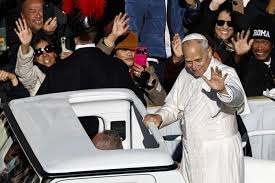In May 2001, Pope John Paul II stood on the sacred soil of Damascus during a landmark pilgrimage—the first of its kind to Syria—signalling a new era under the newly installed regime of the now-deposed Bashar al-Assad. That historic visit carried a clear message: the urgency of interfaith dialogue and the central role of Christians as conduits of communion. Nearly a quarter of a century later, the eyes of Syria’s Christian faithful turn with hope to Pope Leo XIV’s impending visit to Lebanon in November 2025, yearning for a renewed message of peace amid complex and fragile circumstances. Many perceive the Pontiff’s choice of Lebanon as his first official destination not merely as a blessing for its people but as a resonant declaration to the broader Christian mosaic of the East.
Appeals to Support the New Syrian State
Dr Nawar Najma, spokesperson for the Supreme Elections Committee, voiced the hopes of Syria’s Christians regarding the papal visit and the Vatican’s continued engagement. “We deeply value the Vatican’s principled and consistent support for the Syrian Revolution,” he said, “a position reflected in numerous messages sent to the former regime, condemning the atrocities committed in the notorious Sednaya Prison.”
Najma highlighted the Vatican’s historic stance on preserving the Christian presence in Syria, stressing its rejection of forced emigration and its commitment to protecting one of Christianity’s oldest heartlands. He explained that the Holy See has long promoted Muslim-Christian coexistence within the framework of a sovereign Syrian nation, empowering believers to live as equal citizens.
Speaking to Al-Modon, Najma addressed the current international landscape: “The Holy Father has recently called explicitly for sanctions on Syria to be lifted, while also affirming the vital place of Christians in Syrian society.” He added, “Syria’s Christian sons and daughters now call on the Vatican to support the emerging Syrian state and help alleviate sanctions on its people—a step that would bring prosperity to all Syrians, Muslims and Christians alike.”
Najma also revealed a significant political development: “President Ahmad al-Sharaa will increase the parliamentary quota for Christians beyond what is outlined in the forthcoming Constitutional Declaration, with the new legislature set to convene imminently.”
A Message of Hope and Political Relevance
From the perspective of the Church in Syria, Archbishop Julian Yaqoub Murad, head of the Syriac Catholic Archdiocese of Homs and surrounding areas, told Al-Modon: “Pope Leo’s first apostolic visit to Lebanon—and to the broader Middle East—is not only for the Lebanese; it embraces us Syrians as well.” He noted that “the Pontiff’s decision to meet with Middle Eastern Christians at the outset of his papacy is a beacon of hope and a clear recognition by the Catholic Church that Eastern Christians represent the foundational roots of the faith.” He called on both Church and world to nurture this presence and preserve its vitality.
The Archbishop viewed the choice of Lebanon as a “powerful symbol of concern” and evidence of the Church’s awareness of the challenges facing these ancient communities. He predicted that the visit would carry “considerable diplomatic and political weight in Damascus,” compelling greater recognition of Syria’s Christian presence and its importance, especially at a time when political turbulence continues to exclude Christians from meaningful participation in national life.
“It is a role we are ready to fulfil,” he said, “but under the prevailing order—a monolithic system dominated by a singular and unyielding authority—there is little space for genuine political agency, despite our leading role in the social sphere.”
Archbishop Murad also drew attention to the plight of Christian communities in northeast Syria: “In Kurdish-controlled areas, our brothers and sisters are cut off from the global Church and from regional Christian networks, inflicting serious harm on what remains of the Christian presence there.”
Retired Brigadier General Dr Rizq Elias echoed these sentiments, asserting that the Pope’s visit to Lebanon would bring renewed reassurance to Christians in both Syria and Lebanon. “If His Holiness affirms that their continued presence must shine as a beacon of love in the land of Christ, then it will be a powerful affirmation of their role as a light to the world,” he said.
A Call for Coexistence Amid Struggle
Whereas Pope John Paul II’s visit to Damascus in 2001 occurred under a veneer of “stability,” delivering messages of “dialogue” and “partnership,” Pope Leo XIV’s upcoming trip to Lebanon takes place at a time of extreme delicacy. His message will call on Christians to stand in solidarity with Syria’s diverse communities in a nation emerging from the ashes of war and navigating a precarious transitional phase.
A quarter-century ago, Pope John Paul II, upon entering the Umayyad Mosque, famously declared: “We must ask divine forgiveness for every time Muslims and Christians have hurt each other, and offer one another mutual pardon.”
Today, the message Pope Leo will deliver from Beirut—as once from Damascus—will affirm that the future of the East is inextricably tied to its diversity and the peaceful coexistence of its peoples. Despite the trials facing Syria’s Christians—from geographic isolation to curtailed political participation—this visit stands as a radiant affirmation that the world has not forgotten the “ancient roots of Christianity” in a land that has long been, and remains, a cradle of civilisation and faith.
This article was translated and edited by The Syrian Observer. The Syrian Observer has not verified the content of this story. Responsibility for the information and views set out in this article lies entirely with the author.
